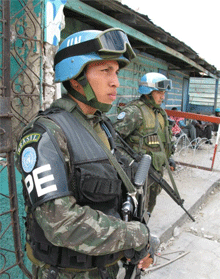With unbounded hypocrisy, the United States shrieks “democracy!” at the world while denying Haitians every political right of citizenship in their own land. Having deposed and kidnapped the popularly elected president, Jean-Bertrand Aristide, in 2004, the U.S. now pretends not to be the main party standing in the way of his return from South African exile, ahead of the scheduled 20 March run-off elections. Meanwhile, former dictator “Baby Doc” Duvalier re-entered unimpeded on an expired Haitian passport.

If diplomacy is a form of lying, then the United States’ efforts to delay indefinitely the return to Haiti of former President Jean-Bertrand Aristide, is a triumph of the most foul diplomacy. Aristide has a passport, but no permission to land in Haiti and, it appears, no permission to take off from South Africa, where he has lived in exile since his overthrow in a U.S.-backed coup in 2004.
The passport was provided by the outgoing government of Aristide’s onetime ally, President Rene Preval. But the U.S., which really runs the country in a troika with France and Canada, is unalterably opposed to an Aristide comeback. After last year’s devastating earthquake, the Americans said Aristide would be a distraction from the job of national reconstruction. Very little in the way of reconstruction has gotten done since then, but the Americans now claim that Aristide would distract from the runoff elections scheduled for March 20. Three out of four Haitians were already distracted from taking part in the first round of elections in November, without Aristide’s presence. That was undoubtedly because Aristide’s party, Fanmi Lavalas, by far the most popular political grouping in the country, was prohibited from participating – also at the insistence of the Americans and the tiny Haitian elite with which they are allied.

Brazil acts as rent-a-cop for the United Nations mission in Haiti, MINUSTAH, but documents show the United States has pressured Brazil to use its influence with South Africa to keep Aristide’s feet planted firmly on African soil. Brazil dearly wants to get a seat on the United Nations Security Council, and feels it cannot afford to make the Yankees angry. South Africa claims its under no pressure from anybody, but then claims it has an obligation to consult “all the role-players to work out the ideal conditions for him to go back.” Clearly, those “role-players” are the Americans and their French and Canadian co-conspirators. Aristide’s lawyer says he will not attempt to leave South Africa without permission.
Of course, if South Africa gave its blessing to an Aristide flight to Haiti, the U.S. would be forced to abandon the charade and give Aristide a yes or a no, in its own voice – which would expose Washington as the occupying power in Haiti. Gone would be all pretensions that the Americans favor Haitian democracy. In hopes of putting the U.S. on the spot, a group of social activists, including Rev. Jesse Jackson, Danny Glover, Randall Robinson, Dick Gregory, and 11 others sent a letter, last week, to South African President Jacob Zuma. The letter expressed hope that President Zuma “can assist the Aristides in making their transition as soon as possible.” It said, “All the last remaining obstacles to the Aristides’ return have been removed” and expectations have been raised among Haitians that Aristide will soon arrive.
But even Aristide’s lawyer, Ira Kurzban, who was wildly optimistic only a few weeks ago, seems resigned that Aristide won’t be going home any time soon. So, all the Haitian people have to look forward to is this month’s elections that they didn’t want, anyway, for candidates that were essentially forced on them by the United States – an exercise that nobody but Americans believes has anything to do with democracy.

 Articles by this author
Articles by this author















Stay In Touch
Follow us on social networks
Subscribe to weekly newsletter